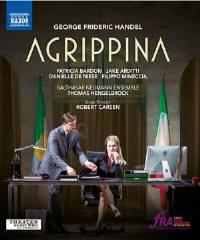Texte paru dans: / Appeared in: |
|
|
Outil de traduction (Très approximatif) |
|
|
Reviewer:
David Vickers Robert Carsen’s production of Agrippina (Venice, 1709), filmed across two performances at the Theater an der Wien in March 2016, is a paradox that is simultaneously sophisticated and clumsy, often insightful but frequently vexing for ubiquitous clichés in its approach. Placing only one interval in the middle of Act 2 displaces the original and careful structure and pacing of the three-act drama. Important features of the text are lamentably bowdlerised; the exchanges between characters in the lead-up to the unjustly scorned Ottone’s soliloquy ‘Voi che udite’ are not only considerably cut down but also reshuffled to give Poppea more prominence. There are some other unfortunate cuts, most regrettably the omission of Ottone’s lovely little continuo aria ‘Tacerò’ (a common mistake that ought not be made). There is a predictable subversion of the lieto fine presented by the final chorus: we see Nero ordering the murders of everyone else and cackling insanely as Rome burns – as if the audience did not know that his becoming Claudius’s successor turned out to be a bad thing. On the other hand, Carsen presents characters, their interactions and motivations with cleverness, wit and flawless timing. The production juggles political and sexual scheming, comedy and seriousness in consistently entertaining and compelling action that only resorts to superficial farce when it is called for – in Act 3 the successive visits of three frustrated lovers hiding from each other in Poppea’s bedroom is hilariously done (despite the cuts), and the next scene cuts to a fantastic visual gag of the despairing Agrippina watching it all unfold on CCTV footage (less bothered by Claudius’s attempted infidelity than by her foolish son Nero’s botching his chances of being named as the emperor’s successor). Set in an environment that is a bit like The West Wing transplanted into Fascist Rome of the 1930s (Claudius is blatantly Mussolini), a lot of the technical and artistic qualities of the production work incredibly well. Patricia Bardon plays the scheming title‑role with deviousness and sexual energy. Mika Kares’s Claudius is boorish, pompous, childish and nasty. Jake Arditti portrays Nero with spirited animation and comic absurdity. Poppea’s development from shallowness and gullibility to vulnerability and wisdom is acted wonderfully by Danielle de Niese (her singing is a mixed bag). Filippo Mineccia is a magnetic and versatile stage performer as the honourable yet naive Ottone; his singing is occasionally hard-edged, but an inserted love duet (rejected by Handel) proving the sincerity of his relationship with Poppea is sensitively done. Thomas Hengelbrock’s full-blooded conducting of the Balthasar Neumann Ensemble has theatrical acumen and is vividly sonorous whether sweet, dark, seductive or furious. Although quick music crackles vigorously, briskness is often at the expense of detail. |
|




